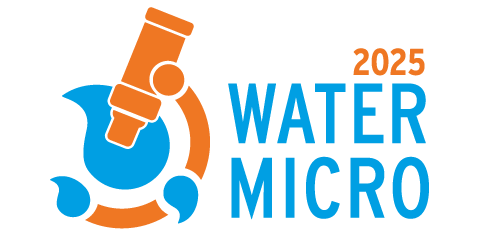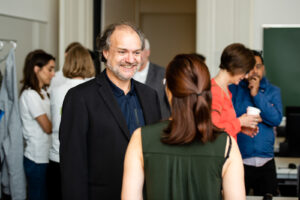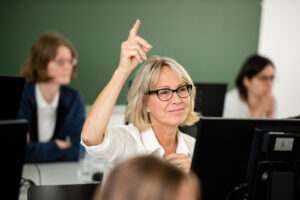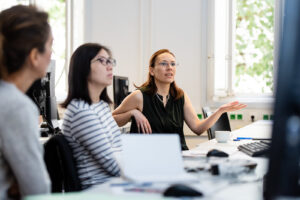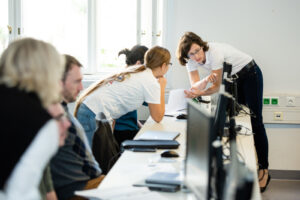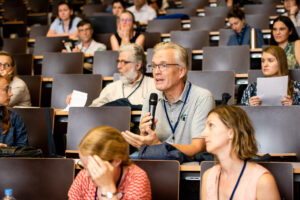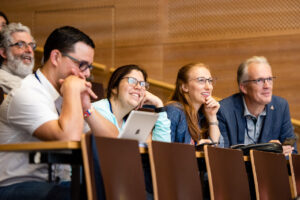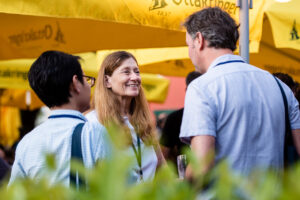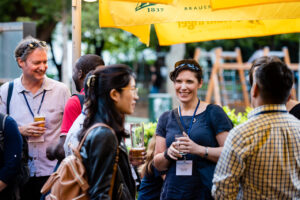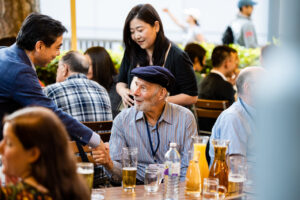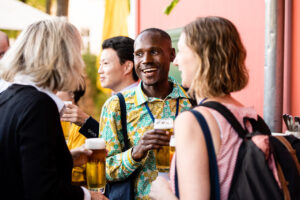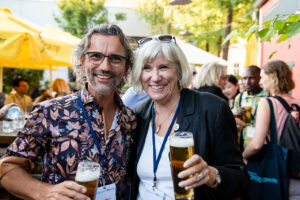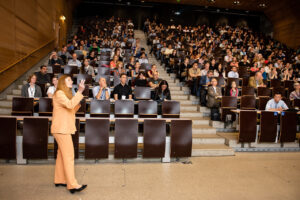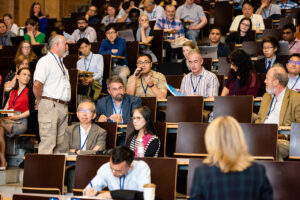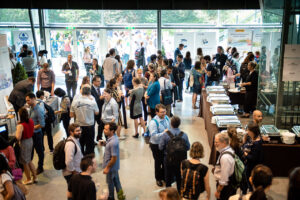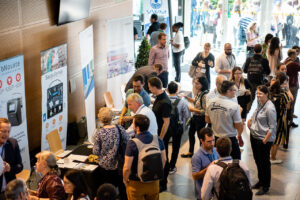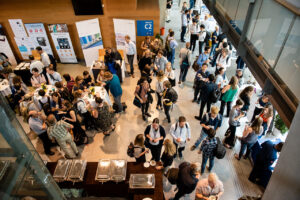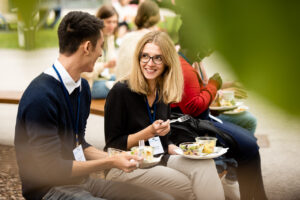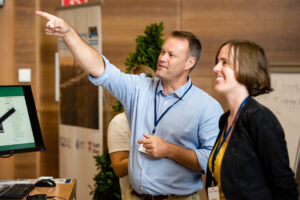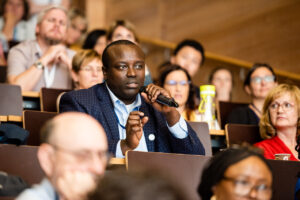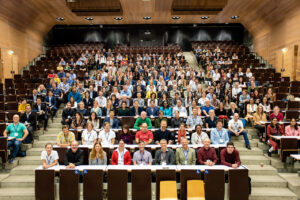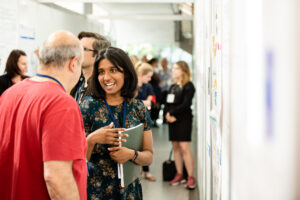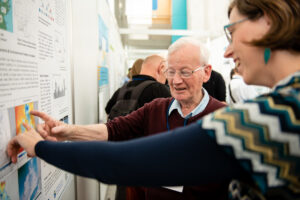Panta rhei: everything flows. Our world, climate and environment is changing. Water is at the center of this global change, and providing safe water and sanitation to the citizens of the world is more challenging than ever before. The symposium program will cover all aspects of health related water microbiology in the whole water cycle in our changing world. It will cover basic and applied research, and how to turn this knowledge into impact.

22nd Health Related Water Microbiology Conference
Amersfoort (NL), 15 – 20 June 2025
Welcome to WaterMicro 2025
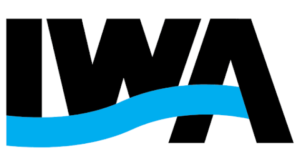
This website will grow with more information as we move closer to Watermicro25.
To reduce the footprint of the conference, only vegetarian and vegan meals will be provided.
The Netherlands and Water
There’s one recurring essence that flows through the Netherlands’ history and binds its people together: water. From the Mesolithic tribes that hunted on canoes to the explorers that set sail and ventured beyond the edges of the known-world, water has always shaped the Netherlands and its people. Despite the fact that the Roman author Pliny …
READ MORETHE NETHERLANDS AND MICROBIOLOGY
There is something with the Dutch and microbiology. Who was the first to discover bacteria and protozoa? That was Antoni van Leeuwenhoek, who lived in Delft in the 17th century and built his own microscopes. His work laid the foundations for the sciences of bacteriology and protozoology. He was the first to see and document …
READ MOREHealth related Water Microbiology conferences
The Netherlands was host to the 2nd seminar of the International Association on Water Pollution Research and Control (IAWPRC) Study Group on Virology (the predecessor of IWA and the Health-Related Water Microbiology Specialist Group) in 1984 in Amsterdam/Bilthoven. The proceedings, which are published in Water Science and Technology Vol. 17, No. 10, 1985, show that …
READ MORECONFERENCE THEME: SAFE WATER IN A CHANGING WORLD
TOPICS
Global change and water safety
• Epidemiology of waterborne and water-based diseases
• Drinking water and health
• Recreational water and health
• Water reuse and health
• Water, food and health
Global change and microbial hazards
• Pathogens in water
• Pathogens in aerosols
• Antimicrobial resistance in water
• Survival, persistence, transport, fate
• Extreme weather events and pathogen health risks
• Climate change and pathogen health risks
• Pandemics and waterborne pathogens
New tools
• Novel methods
• Metagenomics, metaviromics, bioinformatics
• Microbial source tracing
• Modelling and prediction
Water as information source for health
• Wastewater surveillance of infectious diseases and antimicrobial resistance
• QMRA, decision analysis, water safety plans
Control options in a changing world
• Catchment protection
• Water treatment and disinfection
• Biostability
• Criteria, standards and monitoring
Impact
• Showcasing good examples of science-to-impact
• Tools and measures supporting safe water and sanitation in developing countries
• Water management in disaster situations and extreme events
Our Team

Ana Maria de Roda Husman is professor of global change and environmentally transmitted infectious disease at Utrecht University, and directs infectious disease research and prepares policy advise at the National Institute for Public Health and the Environment (RIVM). Her team focuses on the prevention and control of infectious diseases that are transmitted via the environment: outbreak response, capacity building, technological advances to avert climate change and promote sustainability, determine the level of exposure to pathogens in the environment and therefore the disease burden. She was pivotal in setting up the Dutch wastewater surveillance as a human surveillance tool.

Ana Maria de Roda Husman is professor of global change and environmentally transmitted infectious disease at Utrecht University, and directs infectious disease research and prepares policy advise at the National Institute for Public Health and the Environment (RIVM). Her team focuses on the prevention and control of infectious diseases that are transmitted via the environment: outbreak response, capacity building, technological advances to avert climate change and promote sustainability, determine the level of exposure to pathogens in the environment and therefore the disease burden. She was pivotal in setting up the Dutch wastewater surveillance as a human surveillance tool.

Gertjan Medema is principal microbiologist at KWR Water Research Institute and professor of Water and Health at Delft University of Technology. His team focuses on the development of methods for detection and removal of pathogens and antimicrobial resistance in water, conducting Quantitative Microbial Risk Assessment and epidemiological research on the health effects of water systems, and providing advice for the design of safe water systems and policies. His team’s research also helped launch wastewater surveillance of COVID-19.

Gertjan Medema is principal microbiologist at KWR Water Research Institute and professor of Water and Health at Delft University of Technology. His team focuses on the development of methods for detection and removal of pathogens and antimicrobial resistance in water, conducting Quantitative Microbial Risk Assessment and epidemiological research on the health effects of water systems, and providing advice for the design of safe water systems and policies. His team’s research also helped launch wastewater surveillance of COVID-19.

Nynke Hofstra is professor of Water Systems and Global Change at Wageningen University. Her main focus is to apply environmental systems analysis approaches to the field of water quality and health. With her team she develops modelling approaches to assess microbiological water quality and consequent health risks, including hotspots and trends over time. She uses scenario analysis to evaluate the impacts of socio-economic development and climate change, and the influence of interventions on the water quality and health risks.

Nynke Hofstra is professor of Water Systems and Global Change at Wageningen University. Her main focus is to apply environmental systems analysis approaches to the field of water quality and health. With her team she develops modelling approaches to assess microbiological water quality and consequent health risks, including hotspots and trends over time. She uses scenario analysis to evaluate the impacts of socio-economic development and climate change, and the influence of interventions on the water quality and health risks.

Patrick Smeets is a senior scientific researcher in microbiological water quality and health, with over 20 years’ experience in the drinking water sector. He specialises in quantitative microbiological risk analysis and applies this expertise in Dutch and international water safety projects. Besides drinking water, this includes water reuse, bathing water, irrigation, and food and soft drink industry projects.

Patrick Smeets is a senior scientific researcher in microbiological water quality and health, with over 20 years’ experience in the drinking water sector. He specialises in quantitative microbiological risk analysis and applies this expertise in Dutch and international water safety projects. Besides drinking water, this includes water reuse, bathing water, irrigation, and food and soft drink industry projects.

Doris van Halem is professor in Drinking Water Quality & Treatment at Delft University of Technology. Her research focusses on understanding contaminant behaviour in natural waters towards development of innovative and sustainable water treatment technologies. As programme leader of Delft Global Initiative’s programme TU Delft | Water for Impact, she is responsible for stimulating water research in and with the Global South.

Doris van Halem is professor in Drinking Water Quality & Treatment at Delft University of Technology. Her research focusses on understanding contaminant behaviour in natural waters towards development of innovative and sustainable water treatment technologies. As programme leader of Delft Global Initiative’s programme TU Delft | Water for Impact, she is responsible for stimulating water research in and with the Global South.

Prof. Heike Schmitt works on the transmission of antimicrobial resistance (AMR) from the environment to humans and is combining fundamental and applied research with capacity building. At the National Institute for Public Health and the Environment (RIVM), she is theme leader on AMR in the environment, and leads the environmental part of the Dutch National Action Plan on AMR. She has applied wastewater based epidemiology (WBE) for several years, focusing on wastewater analysis to monitor circulation of WHO resistant priority pathogens in the general population. She works on capacity building for international One Health surveillance of antibiotic resistance, and on the relevance of inadequate WASH for exposure to AMR, within the WHO Collaborating Center on Risk Assessment of Pathogens in Food and Water. She is coordinating several international research consortia and contributes to national and international advisory bodies. She also holds a part-time position as professor at TU Delft, where she focuses on fundamental research around microbial ecology of AMR in wastewater treatment, and as scientific advisor at the European centre of excellence for sustainable water technology (WETSUS).

Prof. Heike Schmitt works on the transmission of antimicrobial resistance (AMR) from the environment to humans and is combining fundamental and applied research with capacity building. At the National Institute for Public Health and the Environment (RIVM), she is theme leader on AMR in the environment, and leads the environmental part of the Dutch National Action Plan on AMR. She has applied wastewater based epidemiology (WBE) for several years, focusing on wastewater analysis to monitor circulation of WHO resistant priority pathogens in the general population. She works on capacity building for international One Health surveillance of antibiotic resistance, and on the relevance of inadequate WASH for exposure to AMR, within the WHO Collaborating Center on Risk Assessment of Pathogens in Food and Water. She is coordinating several international research consortia and contributes to national and international advisory bodies. She also holds a part-time position as professor at TU Delft, where she focuses on fundamental research around microbial ecology of AMR in wastewater treatment, and as scientific advisor at the European centre of excellence for sustainable water technology (WETSUS).

Professor Jack Schijven is senior scientist and modeller at the Centre for Infectious Disease Control, National Institute for Public Health and the Environment (RIVM), Bilthoven, the Netherlands. He is professor by special appointment for Quantitative Microbiological Water Safety at Utrecht University.
His field of research combines quantitative water microbiology, hydrology, geochemistry and risk analysis in an environmental and health sciences context. Transport models are being developed and embedded in quantitative microbiological risk assessments for public health purposes.
The research is an important basis for drinking water policies in the Netherlands, but microbiological water safety also requires much attention in the rest of the world.
He has developed the following interactive computational tools:
QMRAspot for Quantitative Microbiological Risk Assessment (QMRA) of drinking water produced from surface water.
QMRAwell for QMRA of groundwater and calculation of groundwater protection zones.
QMRAcatch for simulation of microbiological quality of surface water, including QMRA for drinking water and bathing water.
QMRAswim for QMRA of bathing water .
SSF for predicting microorganism removal by slow sand filtration as a function of operational conditions.
AirCoV2 for QMRA of aerogenic transmission of SARS-CoV2.

Professor Jack Schijven is senior scientist and modeller at the Centre for Infectious Disease Control, National Institute for Public Health and the Environment (RIVM), Bilthoven, the Netherlands. He is professor by special appointment for Quantitative Microbiological Water Safety at Utrecht University.
His field of research combines quantitative water microbiology, hydrology, geochemistry and risk analysis in an environmental and health sciences context. Transport models are being developed and embedded in quantitative microbiological risk assessments for public health purposes.
The research is an important basis for drinking water policies in the Netherlands, but microbiological water safety also requires much attention in the rest of the world.
He has developed the following interactive computational tools:
QMRAspot for Quantitative Microbiological Risk Assessment (QMRA) of drinking water produced from surface water.
QMRAwell for QMRA of groundwater and calculation of groundwater protection zones.
QMRAcatch for simulation of microbiological quality of surface water, including QMRA for drinking water and bathing water.
QMRAswim for QMRA of bathing water .
SSF for predicting microorganism removal by slow sand filtration as a function of operational conditions.
AirCoV2 for QMRA of aerogenic transmission of SARS-CoV2.

Monique Bekkenutte is director of the Royal Dutch Water Association. In this capacity she has been involved in knowledge assurance and knowledge development in the Dutch water sector for 15 years. “We are delighted to host the Watermicro25 conference with our leading international scientists from a rich history in microbiology. Precisely because the Netherlands is a compact and densely populated country, there are many challenges for sufficient and clean water. That is why we look forward to the international exchange of knowledge to learn from each other and thus keep our societies healthy and livable.”

Monique Bekkenutte is director of the Royal Dutch Water Association. In this capacity she has been involved in knowledge assurance and knowledge development in the Dutch water sector for 15 years. “We are delighted to host the Watermicro25 conference with our leading international scientists from a rich history in microbiology. Precisely because the Netherlands is a compact and densely populated country, there are many challenges for sufficient and clean water. That is why we look forward to the international exchange of knowledge to learn from each other and thus keep our societies healthy and livable.”

Sijia Kong received the B.S. degree and the M.S. degree in Environmental Engineering from Ocean University of China in 2017 and 2020, respectively. She is currently working toward the Ph.D. degree in Sanitary Engineering at the Faculty of Geoscience and Civil Engineering at the Delft University of Technology, the Netherlands. Her research interests include environmental microbiology, drinking water treatment, and metagenomics. Specifically, it concerns the occurrence of microorganisms in the water cycle (wastewater, surface water, groundwater, drinking water), the transport of microorganisms in the subsurface (bank filtration, infiltration, groundwater abstraction) and the removal of microorganisms in natural water treatment processes, mainly soil purification. Based on her research, she was awarded an IWA 2023 YWP Scholarship Prize for best YWP abstracts at WaterMicro23.

Sijia Kong received the B.S. degree and the M.S. degree in Environmental Engineering from Ocean University of China in 2017 and 2020, respectively. She is currently working toward the Ph.D. degree in Sanitary Engineering at the Faculty of Geoscience and Civil Engineering at the Delft University of Technology, the Netherlands. Her research interests include environmental microbiology, drinking water treatment, and metagenomics. Specifically, it concerns the occurrence of microorganisms in the water cycle (wastewater, surface water, groundwater, drinking water), the transport of microorganisms in the subsurface (bank filtration, infiltration, groundwater abstraction) and the removal of microorganisms in natural water treatment processes, mainly soil purification. Based on her research, she was awarded an IWA 2023 YWP Scholarship Prize for best YWP abstracts at WaterMicro23.

Anne-Merel van der Drift is a PhD candidate in wastewater-based epidemiology at Utrecht University and the National Institute for Public Health and the Environment (RIVM). Her research focuses on the added value of monitoring human pathogens in wastewater to traditional surveillance of infectious diseases.

Anne-Merel van der Drift is a PhD candidate in wastewater-based epidemiology at Utrecht University and the National Institute for Public Health and the Environment (RIVM). Her research focuses on the added value of monitoring human pathogens in wastewater to traditional surveillance of infectious diseases.
Maarten de Jong works as an epidemiologist at the Public Health Service (GGD) Amsterdam and as a field epidemiologist for Doctors without Borders (Médecins sans Frontières). With his PhD research he explores the role of sewage monitoring as a tool for infectious disease surveillance and response in high and low resource settings.

Maarten de Jong works as an epidemiologist at the Public Health Service (GGD) Amsterdam and as a field epidemiologist for Doctors without Borders (Médecins sans Frontières). With his PhD research he explores the role of sewage monitoring as a tool for infectious disease surveillance and response in high and low resource settings.

Leonie Ran is Research Associate Global Health at the national Institute for Public Health and the Environment. She has broad experience in the field of Molecular Biology and Molecular Diagnostics. At RIVM she is supporting various research projects into antimicrobial resistance and other pathogens in the water environment.

Leonie Ran is Research Associate Global Health at the national Institute for Public Health and the Environment. She has broad experience in the field of Molecular Biology and Molecular Diagnostics. At RIVM she is supporting various research projects into antimicrobial resistance and other pathogens in the water environment.

Imke Leenen is a senior consultant and researcher water microbiology and health at H2Oké and STOWA., with over 25 years’ experience in the surface water and wastewater sector
Her main focus is to apply this knowledge into the Dutch and European water projects for example for re-use of wastewater, irrigation or new sanitation concepts.

Imke Leenen is a senior consultant and researcher water microbiology and health at H2Oké and STOWA., with over 25 years’ experience in the surface water and wastewater sector
Her main focus is to apply this knowledge into the Dutch and European water projects for example for re-use of wastewater, irrigation or new sanitation concepts.
Nikki van Bel is a medior scientific researcher at KWR Water Research Institute in microbiological water quality and health, with over 10 years’ experience in the microbiology and the drinking water sector. She specialises in opportunistic pathogens, virus removal and indicators, rapid methods and sensors for microbiological water quality. This is applied to drinking water, bathing water and surface water.

Nikki van Bel is a medior scientific researcher at KWR Water Research Institute in microbiological water quality and health, with over 10 years’ experience in the microbiology and the drinking water sector. She specialises in opportunistic pathogens, virus removal and indicators, rapid methods and sensors for microbiological water quality. This is applied to drinking water, bathing water and surface water.
Émile Sylvestre is an Assistant Professor in the Department of Water Management at Delft University of Technology, Netherlands. Trained as a civil engineer, Émile specialises in the fate and behaviour of pathogenic microorganisms within engineered water systems. His research interests include the development of methods to monitor water quality, assess the efficacy of water treatment processes, and evaluate human exposure to pathogenic microorganisms via drinking water, wastewater, and aerosols. Through Quantitative Microbial Risk Assessment, he aims to elucidate the potential health implications of these exposures, helping to guide public health decisions.

Émile Sylvestre is an Assistant Professor in the Department of Water Management at Delft University of Technology, Netherlands. Trained as a civil engineer, Émile specialises in the fate and behaviour of pathogenic microorganisms within engineered water systems. His research interests include the development of methods to monitor water quality, assess the efficacy of water treatment processes, and evaluate human exposure to pathogenic microorganisms via drinking water, wastewater, and aerosols. Through Quantitative Microbial Risk Assessment, he aims to elucidate the potential health implications of these exposures, helping to guide public health decisions.
Songtao Mei is a PhD candidate of Earth Systems and Global Change group at Wageningen University. His research focus is modelling of antibiotics and antimicrobial-resistant bacteria in rivers in China.

Songtao Mei is a PhD candidate of Earth Systems and Global Change group at Wageningen University. His research focus is modelling of antibiotics and antimicrobial-resistant bacteria in rivers in China.
Ciska Schets is a microbiologist specialized in water and health. She works as a senior scientist at the National Institute for Public Health and the Environment (RIVM). She has a broad and long experience in research that focuses on the microbiological quality of water and its public health effects. She is the project leader of the recreational water research in the department of Environment, including both surface water and swimming pools. Within this department she is also the theme leader of the water theme. She is representing the Netherlands as an expert member in the European Microbiology Expert Group which provides advice to the European Commission on water quality and legislation. She is also a member of the WHO Recreational Water Quality Technical Advisory Group and contributed to the revised WHO Guidelines on recreational water quality.

Ciska Schets is a microbiologist specialized in water and health. She works as a senior scientist at the National Institute for Public Health and the Environment (RIVM). She has a broad and long experience in research that focuses on the microbiological quality of water and its public health effects. She is the project leader of the recreational water research in the department of Environment, including both surface water and swimming pools. Within this department she is also the theme leader of the water theme. She is representing the Netherlands as an expert member in the European Microbiology Expert Group which provides advice to the European Commission on water quality and legislation. She is also a member of the WHO Recreational Water Quality Technical Advisory Group and contributed to the revised WHO Guidelines on recreational water quality.
Anniek de Jong is a specialist in microbial water quality and its impact on human health at Deltares, an independent knowledge institute in the Netherland. Her expertise lies in the development and application of innovative detection methodes for antibiotics, antibiotic resistance, and pathogens in water systems for the use in both laboratory and field settings. By advancing analytical techniques and practical solutions, and with data obtained in projects, she supports authorities at local, national, and regional levels in improving water quality and safeguarding public health.

Anniek de Jong is a specialist in microbial water quality and its impact on human health at Deltares, an independent knowledge institute in the Netherland. Her expertise lies in the development and application of innovative detection methodes for antibiotics, antibiotic resistance, and pathogens in water systems for the use in both laboratory and field settings. By advancing analytical techniques and practical solutions, and with data obtained in projects, she supports authorities at local, national, and regional levels in improving water quality and safeguarding public health.
Jesse Limaheluw is a researcher and PhD candidate at the Dutch National Institute for Public Health and the Environment (RIVM). His research focuses on the effects of climate change on human infectious diseases, particularly those transmitted by water.

Jesse Limaheluw is a researcher and PhD candidate at the Dutch National Institute for Public Health and the Environment (RIVM). His research focuses on the effects of climate change on human infectious diseases, particularly those transmitted by water.
Proudly organized by
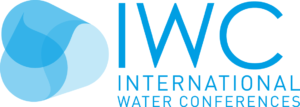

22nd Health Related Water Microbiology Conference
Amersfoort (NL), 15 – 20 June 2025
Amersfoort is European city of the year 2024
Contact Us
Stay tuned, contact us via the contact options below and stay up to date with these links to channels of the Health-related Water Microbiolog Specialist Group
Contact Information
- Telefoon+3170 322 2765
- E-mailinfo@waternetwerk.nl
- AdresKoningskade 40, 2596 AA Den Haag, NL
